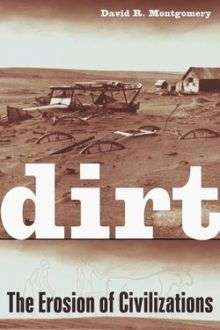Earth's dirty little secret: Slowly but surely we are skinning our planet

Throughout history civilizations expanded as they sought new soil to feed their populations, then ultimately fell as they wore out or lost the dirt they depended upon. When that happened, people moved on to fertile new ground and formed new civilizations.
That process is being repeating today, but in a new book a University of Washington geomorphologist argues the results could be far more disastrous for humans because there are very few places left with fertile soil to feed large populations, and farming practices still trigger large losses of rich dirt.
"We're doing the same things today that past societies have done, and at the same rate," said David Montgomery, a UW professor of Earth and space sciences who studies the evolution and structure of the various aspects of the Earth's surface. In essence, he said, we are slowly removing our planet's life-giving skin.
"It only takes one good rainstorm when the soil is bare to lose a century's worth of dirt."
Montgomery is the author of "Dirt: The Erosion of Civilizations," in which he examines how soil is slowly created over time, the vital role it has played in the rise and fall of civilizations from Mesopotamia to Rome, and how it shaped where and how we live today. The 295-page book, published by the University of California Press, is a popular review of scientific literature on soil and farming practices.
In the past, as soil was depleted in a particular region -- the American South during the height of tobacco plantations, for example, or the Great Plains during the Dust Bowl of the 1930s -- people moved to new areas that could support their crops. But Montgomery argues that their primary farming method -- plowing under any crop residue and leaving the surface exposed to wind and water erosion for long periods -- was a major cause of the conditions that drove them from the land.
Flat lands and areas with thicker, richer soil tend to have less natural erosion, while steeper areas have greater erosion from both wind and water. Removing vegetative cover just worsens the problem, Montgomery said.
"If you take sloping land and strip the plants away, it leaves the soil bare and exposed. There will be a huge impact the next time it rains or when the wind blows," he said. "Plow-based agriculture can change the erosion rate of even a flat place like Kansas into the erosion rate of a place like the Himalayas. Basically that type of farming is remaking the surface of the planet."
When the Earth's population was smaller people could move from one place to another and give soil a chance to regenerate. But now, with more than 6 billion people on the planet, that option no longer exists, Montgomery said.
"We're farming about as much land as we can on a sustainable basis, but the world's population is still growing," he said. "We have to learn to farm without losing the soil."
He advocates a wholesale change in farming practices, moving to no-till agriculture, which he says would reduce erosion closer to its natural rate. That method would eliminate plowing and instead crop stubble would remain in the field, to be mixed with the very top layer of the soil using a method called disking. Farmers might need more herbicides to control weeds, but it would take fewer passes of farm machinery -- and thus less fuel -- to tend crops.
Currently about 5 percent of the world's farmers engage in no-till agriculture, the vast majority of them in the United States and Latin America, Montgomery said.
"We don't have to farm the way we do. It's as much a matter of culture and habit as it is of economics, and our habitual ways of farming have gotten people into a lot of trouble through the years," Montgomery said.
"It's more of a conceptual shift than anything else, but it's a conceptual shift that conserves the soil."
Source: University of Washington





















